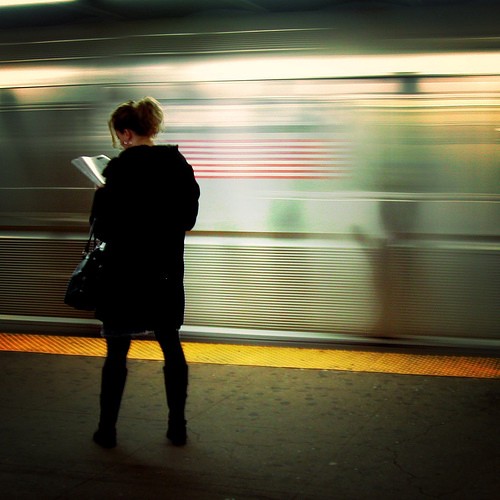Brooklyn Is Hardcover Book Country
by Jessica Machado

A recent Friday expedition on an uptown F train found not a single Kindle, iPad or knickety-knack Nook in sight.
Two young ladies, one clutching her canvas shopping bag, the other with a smart pageboy haircut, were instead reading the ultimate fuck you to the e-reader, the original ambiguous literary doodad: a jacketless hardcover book.
“Feel it,” said Pratt student Chelsea Dowell, about her bare-skinned copy of The Enchantment of Lily Dahl. “It’s sturdy and formidable. Jackets on hardbacks don’t look nice. And I like my book to look good.”
Dowell said she even has no intention to own an e-reader. She instead has bookshelves upon bookshelves of hardcovers, most of which aren’t wrapped in colorful semi-gloss that could easily tackify a hip twentysomething’s apartment. Rows of worn monotone books, as the Times has pointed out, can add vintage charm and intellectual cred to any brownstone walk-up. This lends a complication of aesthetics to a simple choice.
“It’s not my intent to look smart,” she said, “but I can see how it seems snobby to read hardcover books.”
Dowell is not alone in her fondness for naked library castaways. On nearly any train that leaves or enters the crux of thrifty trend-concocting (i.e. Brooklyn), plain-face hardbacks can be found in just as many, if not more, hands than a LCD tablet. (Ride the PATH train to Jersey, or any line to Penn Station, however, and this ratio is reversed.) Unlike the e-reader and iPad, the accessories of choice of the straight-legged business casual fella, the jacket-free book can be regarded as a practical choice or, if you like, a placard of retro chic. And yet it remains as equally anonymous as its electronic counterpart. Its shell is unmarked and free from judgment from train passengers; anything (even a secret Kindle!) could lay between those hard covers and no one would suspect it’s not Pulitzer Prize-worthy literature.
“Yes, I’m reading Candace Bushnell,” said Jennifer Fell, 22, taking her book from her lap to display its spine. “The jacket had pink writing all over it. It was pretty ugly.”
Fell said she’s reading The Carrie Diaries for research for her job as an assistant at HarperCollins, but she also said that she was terribly enjoying it.
Dowell agreed that there is a certain protocol to reading commercial best sellers. “I have to wait at least two years before I can be seen on the subway with a book that was made into a major motion picture,” she said. There is the shame of the mini-billboard cover art that accompanies a book-to-film release. “I don’t want everyone to think that’s why I bought it.”
The same could be said for a book that’s too new or too trendy. In the course of a single afternoon on the L train, three copies of lit Messiah Jonathan Franzen’s second coming, Freedom, were spotted — each without paper wrapping. “It’s just cause it’s a pain to keep on,” explained one young woman in an oversized deer-bedazzled sweater. She raised her brow at the very question of her book’s nakedness. (It should be noted however, this reporter has yet to see someone, anyone, anywhere, reading either Freedom or the new Keith Richards biography with its proper blatant advertisement.)
While some of these hardbacks spotted around Brooklyn are new releases and work perks, the real old school deals are often purchased from book-swapping websites and, presumably, Park Slope rummage sales. The paper trail, so to speak, also leads to Court Street in Cobble Hill, to the aptly named Community Bookstore.
Owner and possible godfather of sardonic hipster disdain John Scioli is a bit of a relic in city’s used bookstore business. The mustached straight shooter does not discriminate against the buying and selling a book without its jacket.
“I’ve never thrown away a book. Who can throw away a book?” he said, and ashed his cigarette on the floor.
Despite the sprouting of fair-trade patisseries and organic baby boutiques around him, Mr. Scioli’s literary hoarder’s nest has been open, successfully, for 25 years. The kicked-in boxes of uncataloged books at the feet of slumped-over bookshelves will not deter the hardbound-hungry who come in with their requests for Wallace Stegner’s Angle of Repose or Shel Silverstein’s The Giving Tree. Scioli’s nimble mind is his own personal Amazon, keeping track of where every single cookbook, young romance novel and European history text can be rescued from his haphazardry.
To draw attention to his anti-e store, Mr. Scioli also leaves a trail of random books along the sidewalk, leading unsuspecting hipnerds astray from their High Life happy hours and tandori tapas for a peek into his den. Most in the neighborhood are already well aware of his “no-book-left-behind” policy and his amassing of thousands of titles, most of which are sold for under $5 — half the price of an electro copy.
Scioli, who has never touched an e-reader, and doesn’t presently own a computer, could be the unsung hero of retrograde cool, the beacon of curmudgeony that will lead resilient hardcover lovers to his treasure trove in the paper apocalypse.
Or, you know, totally not. “When I’m not here, I stay away from books,” he said. “I watch television.”
Jessica Machado has been fabricating trends under the guise of journalism for far too long.
Photo by moriza.
